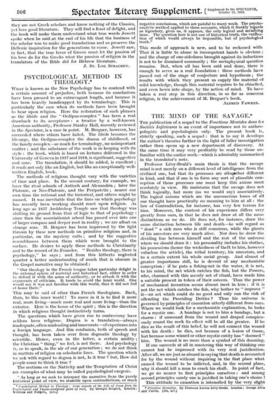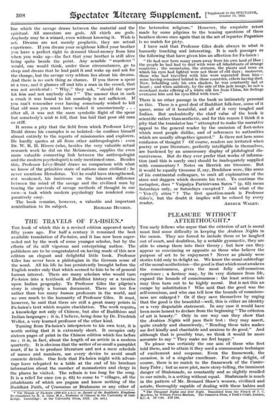THE MIND OF THE SAVAGE.*
THE publication of a sequel to the Fonctions Mentales dans lee Societes Inferieures is an event of importance not to anthro- pologists and psychologists only. The present book is, strictly speaking, such a sequel : that is to say it develops the author's theories further in the light of fuller investigation rather than opens up a new department of discovery. At the same time it may very profitably be read by those un- familiar with the earlier work—which is admirably summarized in the translator's note.
Professor Levy-Bruhrs main thesis is that the savage mind is not merely on a different level of intelligence from the civilized one, but that its processes are altogether different in kind, and that if one is to form any sort of plausible con- ception of those processes one must keep this axiom most resolutely in view. He maintains that the savage does not think logically, but more (as we would say) associatively. The logical axioms which are the unconscious bases of all our thought have practically no meaning to him at all : the law of Contradiction, for instance, has very few terrors for him. Moreover, the content of his experience differs very greatly from ours, in that he does not draw at all the same distinctions as we do. He does not, for instance, draw the same distinction between life and death—he will regard as " dead " a sick man who is still conscious, while the ghosts of his ancestors are very much alive. Nor does he draw the dividing line between himself and the rest of the universe where we should draw it : his personality includes his clothes, his possessions (hence the wickedness of theft to him, however valueless the article), the tribal territory, his ancestors, and to a certain extent his whole social group. And almost of greater importance still, he is devoid of any mechanistic conception : if he puts a fishing-net in the water, it is not, to his mind, the net which catches the fish, but the Powers, who, charmed with this seemly act of ritual, have made him a suitable present in token of their esteem. Thus the power of mechanical invention seems almost inert in him : if it is not the net which catches the fish, why bother to " improve " it—an act which could do no good and only run the risk of offending the Providing Deities ? Thus his universe is governed by principles of causation utterly different from ours. Where we would look for a mechanistic explanation, he looks for a mystic one. A bandage is not to him a bandage, but a charm : if unwound from the wound and draped conspicu- ously round the neck its effect will be all the greater. If he dies as the result of this belief, he will not connect the wound with his death : he dies, not because of a lesion of tissue, but because some wizard or other mystic entity has " doomed" him. The wound is no more than a symbol of this dooming.
If one succeeds at all in mastering this way of thinking one cannot but be impressed with its very real justification. After all, we are just as absurd in saying that death is accounted for by the wound without inquiring in the first place what caused the wound to be infficted, and, in the second place, why it should kill a man to crack his skull. In point of fact, we go no nearer to first principles ourselves: and among second principles surely one is justified in taking one's choice This attitude to causation is intensified by the very slight
• Primitive Mentality. By Professor Lucien Ltvy-Bruhl, London: George Allen and Unwin, [16a, net.] line which the savage draws between the material and the spiritual. All ancestors are gods. All chiefs are gods. Anybody may be a wizard, even without knowing it. Wish is act. Dreams are not merely prophetic, they are actual experience. If you dream your neighbour killed your brother you have a perfect right to demand blood-money from him when you wake up—the fact that your brother is still alive being quite beside the point. Any sensible " murderer " would, one would think, under these circumstances, go to bleep and dream that he had paid it and wake up and ask for the change, but the savage very seldom lies about his dreams. And there is no such thing as chance. If you throw a spear at a tree, and it glances off and hits a man in the crowd, that was not accidental : "Why," they ask, "should the spear hit him and not anybody else ? " The answer that in such a crush it was bound to hit somebody is not sufficient. If you can't remember ever having consciously wished to kill that old man you must have wished it unconsciously . . . after all, it was not the mere symbolic flight of the spear but somebody's wish to kill, that has laid that poor old man so stiff.
It seems a pity that the field from which Professor Levy- Bruhl draws his examples is so isolated—he confines himself almost entirely to the reports of missionaries and explorers. He hardly quotes at all from other anthropologists : even Dr. W. R. H. Rivers (who, besides the very valuable actual research work he did on the Melanesians, supplies the even more valuable connecting link between the anthropologist and the modern psychologist) is only mentioned once. Besides this, Professor Levy-Bruhl draws no comparison with what we know of the primitive state of nations since civilized : he never mentions Herodotus. Yet he could have strengthened, not weakened, his insistence on the inherent difference between the mind of the savage and the civilized man by tracing the survivals of savage methods of thought in our own—a task which modern psychology has rendered com- paratively easy.
The book remains, however, a valuable and important



























































 Previous page
Previous page